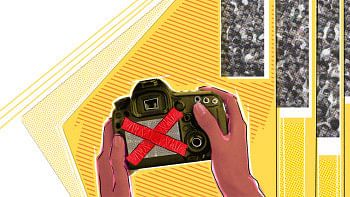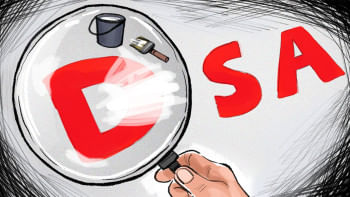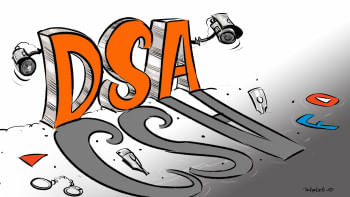DSA 2.0 is every bit as dangerous

The cabinet on Monday approved the final draft of the Cyber Security Act (CSA), bringing the curtain down on two weeks of speculations about it. This is supposed to be a "replacement" for the repressive Digital Security Act (DSA) – a "transformed" and "modernised" version, as state officials initially billed it. However, as a careful reading of the final draft shows, what has transpired, even after the so-called incorporation of feedback from stakeholders, is not a replacement per se but a repackaging of sorts, or as a report by this daily puts it, "a spitting image of the very law it means to improve on." So why bother bringing it in then?
In letter and spirit, the final draft remains almost the same as the one first presented to the cabinet on August 7. Experts have highlighted how it retains all but one offence from the DSA, and how all other changes are related only to sentencing, meaning that all controversial sections/provisions of the DSA remain intact. Moreover, cases filed under the DSA will remain active under the CSA, which means there will be no relief for the DSA victims. And even though we're told that the bill, once passed into law, will have "safeguards" against the filing of cases or arrest without a court order in all but four sections, we know how fragile such safeguards can be when the all-powerful state wants to harass critical voices.
The government claims that it has consulted with the UN's OHCHR before preparing the CSA draft. This is only half-true given the denial by said UN offices, or lack of reflection of their recommendations in the draft. But what about consulting with the most important stakeholders of this law – the journalists? What about addressing the concerns they frequently raised? We still remember how the lawmakers made a mockery of pre-legislative review by media representatives when passing the DSA in 2018. The CSA appears to be headed in the same direction. So far, beyond cosmetic changes and the pretence of consultation, nothing has been done to indicate that citizens' rights to speak, write or publish will not be muzzled.
The government can bulldoze its way through the legislation of DSA 2.0 if it wants, but the fact remains that, in its current form, it is every bit as dangerous as its earlier iteration. We, therefore, urge the government to properly engage with journalists and rights defenders and address their concerns before proceeding any further with the CSA. Not doing so will only further tarnish the country's image abroad.


 For all latest news, follow The Daily Star's Google News channel.
For all latest news, follow The Daily Star's Google News channel. 










Comments